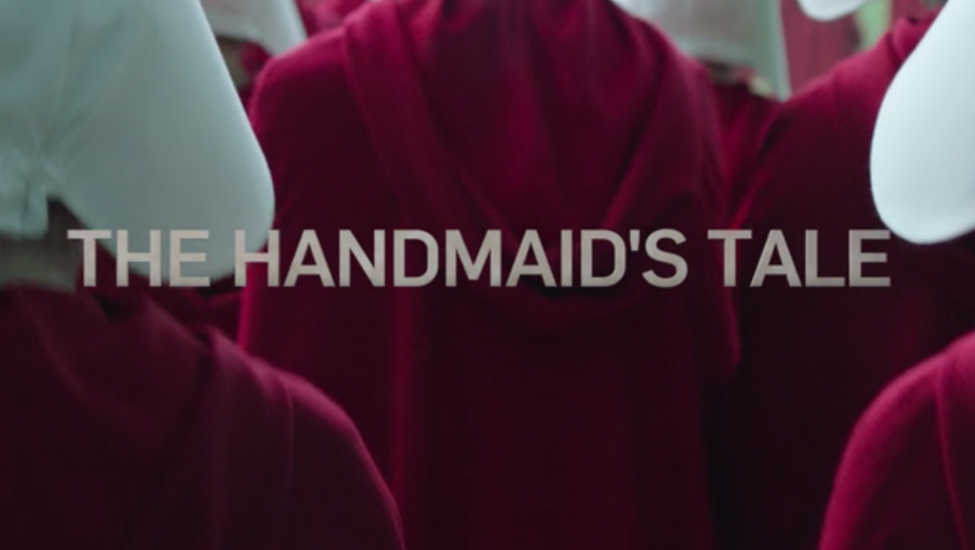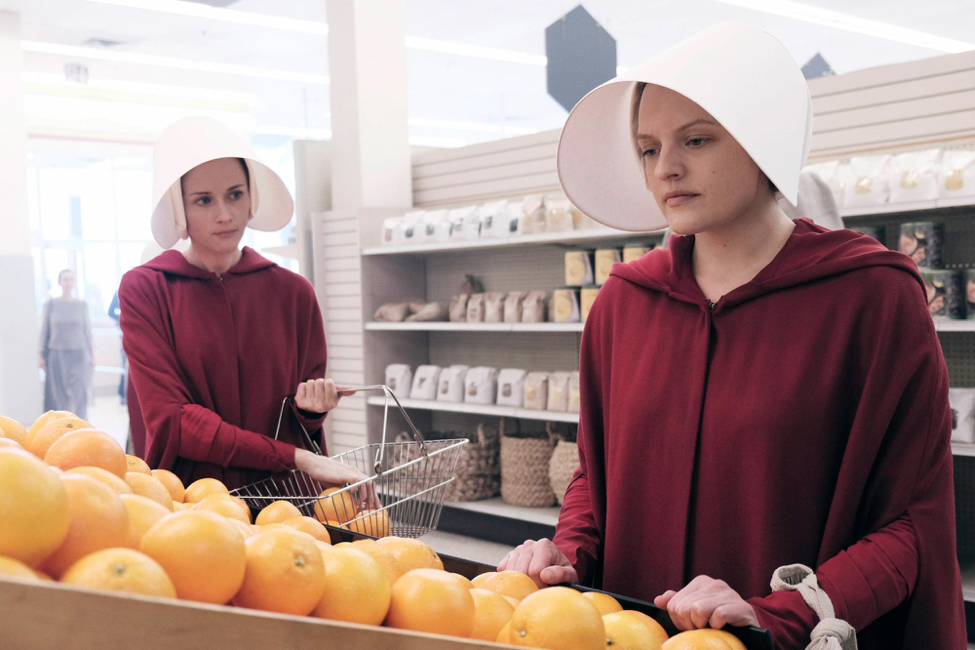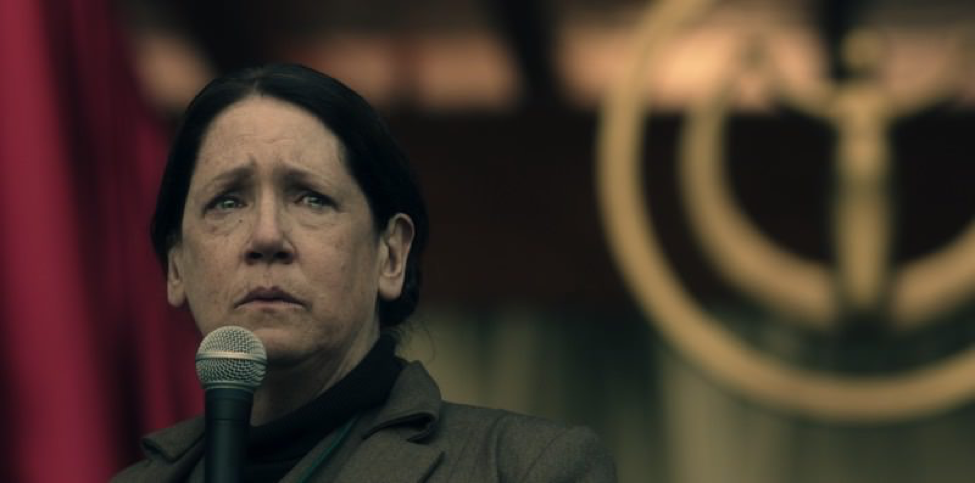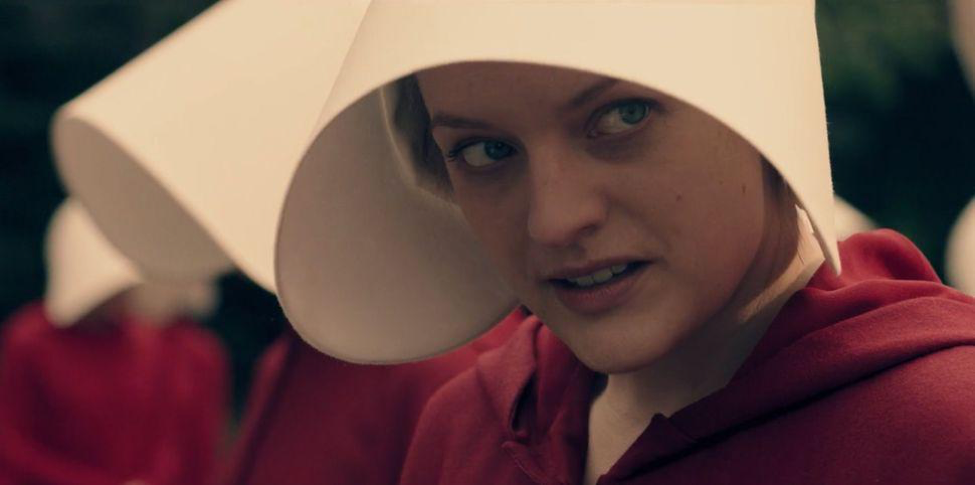In this Crossfader series, our intricate and complex rating system will tell you definitively whether new television pilots are worth your valuable time. We call it: HIT OR SH**.

Cultural theorist and critic Mark Fisher wrote a great essay that perfectly articulates what makes great dystopian fiction. (The focus of the essay was much broader than this, but it will serve our purposes here.) He uses a good chunk of the essay to discuss CHILDREN OF MEN, probably the most impressive piece of apocalyptic fiction in the modern era. He explains that CHILDREN OF MEN is so successful in creating a sense of dread in its audience: “the catastrophe . . . is neither waiting down the road, nor has it already happened. Rather, it is being lived through. There is no punctual moment of disaster; the world doesn’t end with a bang, it winks out, unravels, gradually falls apart.”
It’s appropriate to start a review of THE HANDMAID’S TALE by talking about CHILDREN OF MEN because the show is so obviously indebted to the film. (Yes, both CHILDREN and HANDMAID’S are based on books, but aesthetically, the latter owes a good deal to the former.) From the title inserted in plain text after a dramatic cold open, to an affinity for extended, wide shots, the show clearly takes a lot of cues from the film. What’s more, the show is markedly similar in terms of subject matter; both works imagine a world where most women have been rendered infertile and society has collapsed into brutal totalitarian rule. Much like CHILDREN OF MEN, there is also the constant implication that things are much worse just beyond the boundaries of the rigidly controlled society which we observe. That’s where the similarities end, however, and it’s the differences between the two which make THE HANDMAID’S TALE a difficult show to fully embrace or endorse.

I just want this show to tell me how they got so many oranges inside their Renaissance fair
On the off chance you’ve been off social media entirely in the last few weeks, THE HANDMAID’S TALE is a Hulu original series based on Margaret Atwood’s 1985 novel of the same name. It primarily follows Offred (Elisabeth Moss), a “handmaiden” forced to live as the concubine to a wealthy military family in a theocratic dictatorship. Offred’s internal monologue tells us that things were not always like this, and regular flashbacks routinely show us Offred in her previous life as a typical American woman in the 21st century. She is one of many Handmaidens, the rare women who have somehow remained fertile when an unexplained ecological disaster has rendered most women entirely the opposite. The pilot also spends a good amount of time showing how Offred and a number of other women were socialised to become Handmaidens, instructed by a cartoonishly cruel headmistress called Aunt Lydia.

How did they not get Kathy Bates for this role?
Overall, it’s well shot, mostly well-acted, and individual scenes are incredibly effective. However, poor choices made in the plotting really prevent it from succeeding. The pilot jumps back and forth between two different time periods: the catastrophe just down the road and the catastrophe as it has already happened. The trouble for us as an audience is that this makes the experience of the characters incredibly difficult to relate to. When the main storyline depicts a world so vastly different from our own, a world where fanatical puritanism has driven people to speaking in Bible verses and dressing like they’re eternally LARP-ing in Colonial Williamsburg, you need to give us time to try to make sense of this world. (Why are there no cell phones or computers in this world? What drove people to embrace puritanical Christianity after we were once so secularized? These aren’t nitpicking questions, these are fundamental to orienting ourselves in this world.)
Even more importantly, we need to understand what’s going to drive our protagonists moving forward. The show spends just enough time showing us Offred as she once was that we don’t completely get time to orient ourselves in the person she currently is. For a show with as complex a world as the HANDMAID’S TALE, world building and flashbacks are important, but the pilot would probably have been better served leaving us completely in the present and trusting us to pick up on context clues. Non-linear story structures can heighten a lot of different narratives, but it’s hard not to feel like a limitation in this particular case.

“Bih, you think you can jus’ leave the Bloods like it nothin’?”
A lot has been made about how prescient THE HANDMAID’S TALE feels in light of our current political climate, but that’s hard to agree with. While it is absolutely true that women are under threat by Donald Trump’s presidency, the threat is a more subtle one than is depicted in this show. The last abortion clinic in Kentucky could be shut down any day now, birth control access could be severely restricted if the AHCA passes, and the cultural effect of having a new sexual assaulter in chief will no doubt be devastating over time. What’s more, we have a president who seems more than willing to expand the power of the military, the police, and the surveillance state to frightening extremes. Misogyny is absolutely alive and well, and we are certainly moving closer towards autocratic rule, but the hysteria that the events depicted in THE HANDMAID’S TALE “could totally happen” misses the slow collapse happening right in front of us in real life. Donald Trump’s campaign was not successful based on nostalgia for 1620, but rather for nostalgia for 1950, an era his electorate could actually remember. We are regressing as a culture, but to imagine us regressing all the way back to a perverted Calvinism still feels like a stretch.
As a result, it’s difficult not to interpret THE HANDMAID’S TALE as another form of liberal escapism. It is easier to scare ourselves with tales of what could come while remaining complacent to the things that are happening. This isn’t to criticize people who are currently enjoying the series, but rather to encourage its audience to try to avoid projecting more importance and feelings onto this show as something greater than as a piece of entertainment. I am critical of the show for its supposed “realism,” because it fails to give much of a sense of how the wider world beyond Offred’s immediate experience continues to function at all, because that world is so incredibly removed from our own. Maybe, as the series goes on, we’ll get a sense of how Atwood’s bizarre world keeps turning, but as it stands, the show feels like a way to take the horrors of misogyny and put them on the screen to disturbing (but not cathartic) effect.
Mark Fisher explains that CHILDREN OF MEN is effective because “the world it projects seems more like an extrapolation or an exacerbation of ours than an alternative to it.” I don’t want this show to be a TV adaptation of CHILDREN, but I do want it to make me feel like the world I’m seeing on screen relates somehow to the world I’m inhabiting. HANDMAID’S fails this test, at least initially. We are living through a catastrophe of our own right now, and it’s happening in the expansion of the surveillance state, the restriction of women’s rights, and the aggressive acceleration of the prison industrial complex. It’s happening through climate inaction. It’s happening through the elimination of working class livelihoods. Personally, there are too many real things to be afraid of to continue scaring myself with a TV series as fantastical as this.
Verdict: Sh**
THE HANDMAID’S TALE is available to watch in its entirety on Hulu
